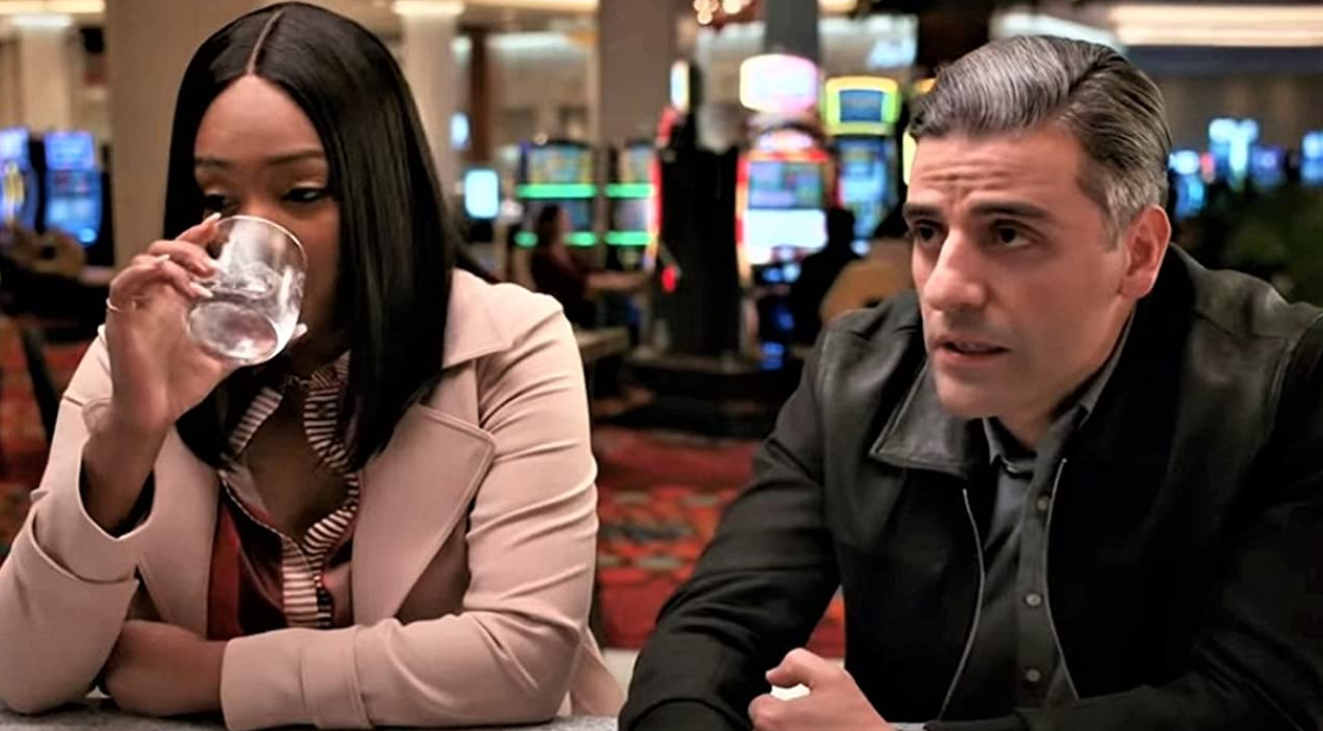
There are a large number of scenes in “The Card Counter” (2021) that take place in casinos, especially at blackjack tables and in poker rooms, but this is not a gambling movie.
There is really only one hand of action where we get to see the run of play in detail. In a hand of no limit hold ’em relatively early in a tournament, William Tell (played by Oscar Isaac) opens with a pair of kings in early position. A player in middle position calls with ace-deuce off-suit, and a third player calls with a pair of sevens. The flop comes nine-nine-eight, Tell makes a continuation bet. Middle position woman calls, the pair of sevens drops out. The turn card is a jack, Tell bets, woman calls. The river brings an ace, and Tell goes all in. The woman with ace-deuce thinks about it for a while, and then decides to fold.
I include this hand description for two reasons. One, for anyone who might want to see this movie for silver screen depiction of gambling, you now have all the action the movie delivers outside of wonderfully shot interior scenes of casinos by cinematographer Alexander Dynan.
More importantly, this hand is a good representation of what writer and director Paul Schrader does with the entire movie: set up dramatic moments where characters act in ways that make no sense.
In the hand described above, the woman in middle position should not fold to this bet on the end. As she is calling bets, she has very little to improve her hand outside of an ace coming on the board. When her card comes, and Tell bets everything, a call is a pretty easy decision. And that is not what she does.
This is sadly where we end up with all of our major dramatic characters. We meet them, tension builds, and then they act in ways that have not been established well, if at all.
We learn early in the movie that Tell has done time in prison. He liked the routine there. He used the time to teach himself cards and hone his memory. Once outside, he wanders from casino to casino as an “advantage player” using his skill to win at poker and blackjack, but with modest sums to avoid attention while still allowing him to eke out an existence he seems comfortable with.
Something clearly lurks beneath that stated inner peace, however. Tell has a bizarre ritual around his personal space, and his dreams are haunted. Nevertheless, he is coping, and he makes his way to his next casino.
La Linda (Tiffany Haddish) spots his talent. She is a backer of poker players and offers Tell an arrangement to play for larger stakes in exchange for a share of the winnings. Tell declines, citing his preference for small time play and a lack of obligation, and references his next destination. There is a conference of law enforcement officers in Atlantic City, and he figures them to be cocky overconfident marks.
In Atlantic City, Tell seems to stroll randomly through the conference and ends up in a sparsely attended, droll product pitch made by Gordo (Willem Dafoe).
Cirk (Tye Sheridan) spots Tell in that product pitch, recognizes him by another name, indicates a shared history with Gordo, and wants to talk.It turns out that Gordo is at the root of Tell’s nightmares. Cirk is similarly troubled and wants Tell to join him in a quest for retribution.
There we have it. Characters introduced. Tension. A choice for our protagonist. The cards are laid out well.
Act II starts off interestingly enough, as Tell seeks to resolve this tension by agreeing to join up with La Linda and making Cirk a counter offer that he thinks will take the younger man on a different path.
From there, things fall apart, and not in a believable way. The relationship between Cirk and Tell is missing any real depth. Cirk’s dialogue amount to little more than “I don’t know, what do you want to do?” which does not allow for a lunch choice, let alone drive a move plot forward. La Linda and Tell have chemistry, but the same knowing caution that characterized the start of their partnership is in no way acknowledged as they grow closer. Gordo looms as an idea, but without any real presence aside from one additional flashback.
This is a dark arts house movie. It does not need a happy ending. Tragedy is all about knowing what is coming. Watching the hero and understanding their tragic flaw is like counting cards and seeing the deck get depleted of aces and tens when counting cards. We know where the story is going.
But the end should make sense. When we reach the climax of the action in “The Card Counter”, choices do not make sense because of that overall lack of development. Just like Tell raising and seeing that woman fold ace-deuce on the river.

